New USF center specializes in treating complications of concussions
The University of South Florida has launched a multidisciplinary center with expertise in managing postconcussive syndrome, the sometimes disabling symptoms that linger after a concussion – even long after a seemingly mild head injury.
The USF Concussion Center pulls together experts in neurology, neurocritical care, neurosurgery, neuropsychology, psychiatry, audiology, pediatrics, neuro-otology, ophthalmology, neuroradiology, athletic training, sports medicine and physical therapy.
“A concussion doesn’t have to knock you out to leave lasting effects,” said Gianluca Del Rossi, PhD, ATC, associate professor of orthopaedics and sports medicine at USF Health and director of the USF Concussion Center. “Even mild ones need to be recognized and managed to avoid potentially devastating complications. At USF, we have a team of specialists who offer an integrated approach to handling any physical, cognitive, behavioral and emotional problems that might arise.”
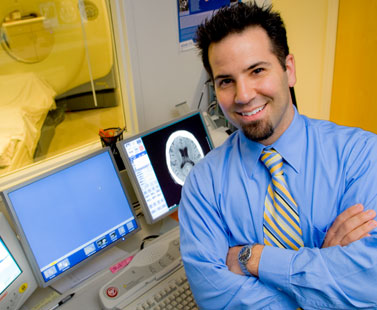
Gianluca Del Rossi, PhD, ATC, directs the new USF Concussion Center.
A concussion is an injury to the brain caused by a blow to the head. Contrary to popular belief, most concussions do not result in loss of consciousness. Even an external bump on the head that appears minor, and shows no signs of internal bleeding or physical swelling on CT scan, could have been preceded by an internal brain “whiplash.” This usually happens when the head accelerates and stops suddenly, prompting the brain to bounce back and forth against the skull’s hard surface. This jarring can cause intense headache, confusion, dizziness and nausea. Injuries from sports, falls and car crashes are among the most common causes of concussions.
Most concussions resolve on their own within a week or so with medical attention and rest, Del Rossi said, but some patients with mild head injury develop a troubling set of symptoms known collectively as postconcussive syndrome, or PCS, which last longer than three months. These may include headache, dizziness, fatigue, memory problems, trouble concentrating, sleeping problems, depression, and anxiety, and the complications can persist for months or even years.
“The accumulation of impacts on the brain over time may increase the time needed for a full recovery and may increase the likelihood of developing dementia-related conditions,” Del Rossi said.
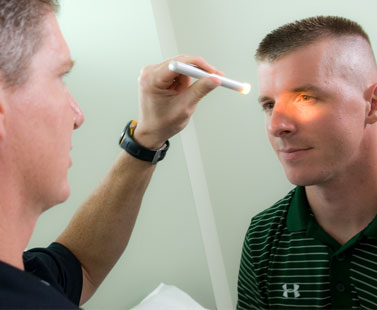
Dr. Eric Coris, director of Primary Care Sports Medicine a member of the USF Concussion Center, demonstrates some post-concussion neurological testing.
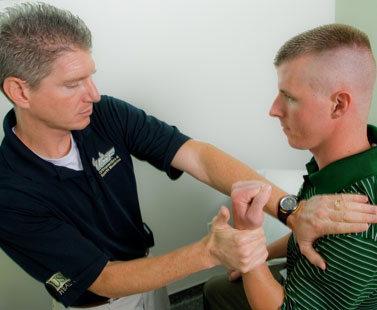
Several studies, including one commissioned by the NFL Players Association, have found that football players have a higher rate than normal of Alzheimer’s disease and other cognitive impairments. Del Rossi mentions the Cincinnati Bengals receiver found to suffer a chronic brain injury that may have affected his mental state and behavior before he died last year after falling from the back of a pickup truck.
PSC can be challenging to diagnose because many of its symptoms are associated with other potential disorders unrelated to head injury, Del Rossi said. “At times, it can be difficult to tie some of the behavioral and emotional changes that often accompany PCS – like irritability, anxiety, impaired memory or judgment, and depression — back to the concussion that may have occurred months earlier.”
Symptoms of PCS vary from patient to patient and require individual, yet coordinated, evaluation and treatment, Del Rossi said. Chronic headaches or dizziness may be treated by the primary care physician, sports medicine physician or neurologist with medications. Problems with vision may require an ophthalmologist, while a physical therapist may be needed to help with balance retraining. Psychiatrists and psychologists are also essential to team; they can help determine whether behavioral symptoms were brought on by the concussion itself or an underlying illness unrelated to the head injury.
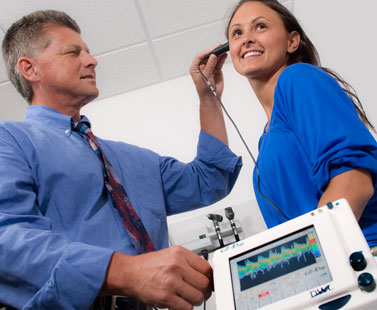
USF neurologist Dr. Michael Hoffmann uses a transcranial doppler device to measure blood flow velocity in the brain’s arteries. He plans to study whether cerebral artery constriction differs in patients with postconcussive syndrome compared to those whose symptoms subside.
Members of the USF Concussion Center plan to conduct research to more definitively identify patients who suffer from PCS and what physiological and psychological factors put some people at higher risk than others for the syndrome. For instance, Michael Hoffmann, MD, professor of neurology at USF Health, wants to investigate whether artery constriction, which slows blood flow to the brain in the immediate aftermath of concussion, is more pronounced or lasts longer in patients who go on to develop persistent neurological problems like impaired memory.
The Center, in collaboration with the USF Sports Medicine and Athletic Related Trauma Institute, will also educate the community about the signs and symptoms of concussion and ways to prevent them.
For more information about the USF Concussion Center, please visit www.USFConcussionCenter.com.
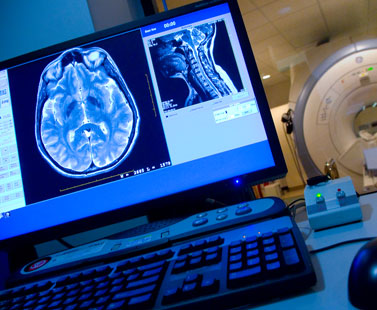
Story by Anne DeLotto Baier, and photos by Eric Younghans, USF Health Communications
RELATED STORY
USF physician: Kids shouldn’t return to game too soon after concussions

